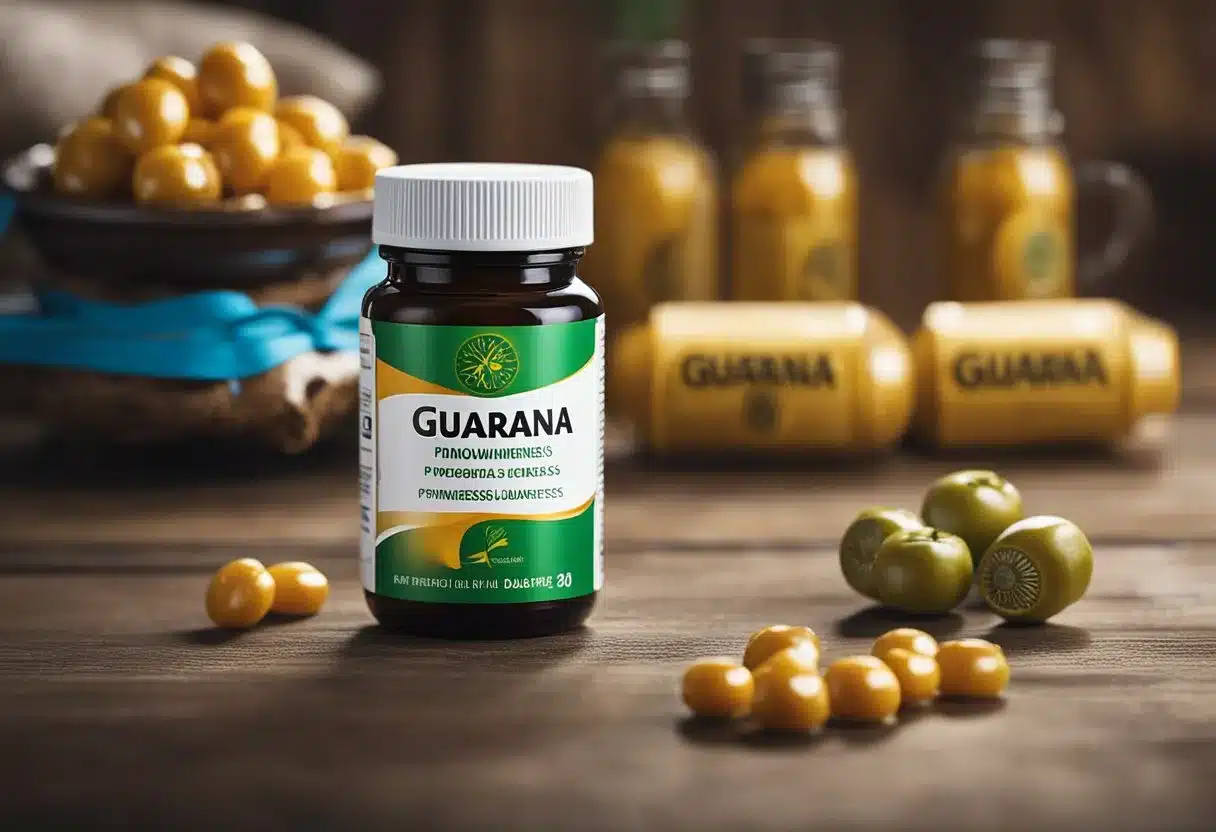Guarana, a plant native to the Amazon, has gained popularity as a dietary supplement. Some people with diabetes wonder if it could help manage their condition. Guarana contains caffeine and other stimulants that might affect blood sugar levels.

Guarana is a plant ingredient found in Sugar Defender, an advanced blend of 24 proven ingredients that supports healthy glucose levels and natural weight loss.
Research on guarana’s effects on diabetes is limited, and its use may come with risks. The plant’s high caffeine content could interfere with blood sugar control in some individuals. It’s important for people with diabetes to talk to their doctor before trying guarana supplements.
While guarana might offer benefits like increased energy and focus, its impact on diabetes management remains unclear. People with diabetes should be cautious and monitor their blood sugar closely if they choose to use guarana products.
Key Takeaways
- Guarana supplements may affect blood sugar levels in people with diabetes
- Caffeine in guarana could interfere with diabetes medications
- Individuals with diabetes should consult a doctor before using guarana products
Understanding Guarana

Guarana is a plant with a rich history and unique properties. It comes from the Amazon rainforest and contains high levels of caffeine. People have used guarana for centuries as a natural remedy and energy booster.
Origin and Botanical Profile
Guarana, scientifically known as Paullinia cupana, is native to the Amazon basin. It grows as a climbing plant in Brazil, Venezuela, and other parts of South America. The plant produces red fruit with black seeds that look like eyes when opened.
Guarana seeds are about the size of coffee beans. They contain more caffeine than any other plant in the world. The plant belongs to the soapberry family and can grow up to 12 meters tall.
Indigenous people have cultivated guarana for thousands of years. They value it for its medicinal properties and use it in cultural practices.
Caffeine Content in Guarana
Guarana seeds pack a powerful caffeine punch. They contain 3-4 times more caffeine than coffee beans. One gram of guarana powder has about 40 mg of caffeine.
The caffeine in guarana is released slowly in the body. This leads to a longer-lasting energy boost compared to coffee. Guarana also contains other stimulants like theophylline and theobromine.
Here’s a comparison of caffeine content:
| Source | Caffeine per gram |
|---|---|
| Guarana | 40-80 mg |
| Coffee | 10-12 mg |
| Tea | 3-4 mg |
Traditional Uses of Guarana
Indigenous Amazonian tribes have used guarana for centuries. They see it as a cure-all and call it “jungle eyes” due to its appearance.
Traditional uses of guarana include:
- Boosting energy and reducing fatigue
- Improving mental focus and memory
- Easing headaches and muscle pain
- Promoting weight loss
- Treating fevers and heart problems
Guarana is now a common ingredient in energy drinks and supplements. People use it to enhance physical and mental performance. Some also take it to help with weight loss.
Modern research is exploring guarana’s potential health benefits. These include its antioxidant properties and possible effects on heart health.
Guarana and Diabetes
Guarana may affect blood sugar, provide antioxidants, and help with weight management in people with diabetes. These effects could impact diabetes care and overall health.
Impact on Blood Sugar Levels
Guarana contains caffeine, which can influence blood sugar levels. In some people, caffeine may cause a short-term rise in blood glucose. This effect can vary from person to person.
For those with diabetes, it’s important to monitor blood sugar closely when using guarana. The caffeine in guarana might interfere with diabetes medications or insulin.
Some studies suggest guarana could improve insulin sensitivity. This may help the body use glucose more effectively. But more research is needed to confirm this effect in humans with diabetes.
Guarana’s Antioxidant Properties
Guarana is rich in antioxidants. These compounds help protect cells from damage caused by free radicals. For people with diabetes, this could be beneficial.
The plant contains tannins, catechins, and other antioxidants. These may help reduce inflammation in the body. Chronic inflammation is often linked to diabetes complications.
Antioxidants in guarana might also support heart health. This is important for diabetics, who have a higher risk of heart disease. However, more studies are needed to fully understand these effects.
Usage in Weight Management for Diabetics
Guarana may aid weight management, which is crucial for many people with diabetes. The caffeine in guarana can boost metabolism and increase fat burning.
Some research suggests guarana might help reduce appetite. This could lead to lower calorie intake and potential weight loss. For obese diabetics, losing weight can improve blood sugar control.
Guarana is often used in weight loss supplements. But it’s important to use caution. High doses of caffeine can cause side effects like rapid heartbeat or high blood pressure. Always consult a doctor before using guarana for weight management with diabetes.
Health Benefits and Risks
Guarana has both positive and negative effects on health. It may help the heart, boost mental performance, and increase energy. But it can also cause side effects like anxiety and sleep problems.
Heart Health and Guarana
Guarana may have some benefits for heart health. It contains antioxidants that could protect the heart. Some studies show it may lower bad cholesterol levels.
But guarana also has risks for the heart. It has a lot of caffeine, which can raise blood pressure and heart rate in some people. This could be dangerous for those with heart problems.
People with heart disease should talk to a doctor before taking guarana. The risks may outweigh any potential benefits for those with heart issues.
Cognitive and Physical Performance
Guarana can boost mental focus and alertness. This is mainly due to its high caffeine content. It may help people feel more awake and think more clearly.
Some studies suggest guarana could:
- Improve memory
- Increase attention span
- Boost reaction time
Guarana might also help physical performance. Athletes sometimes use it to:
- Increase energy
- Reduce fatigue
- Improve endurance
But more research is needed to fully understand these effects. The benefits likely come from caffeine rather than guarana itself.
Potential Side Effects
Guarana can cause unwanted side effects, especially in high doses. Common problems include:
- Anxiety
- Nervousness
- Sleep problems
- Headaches
- Fast heartbeat
These effects are similar to drinking too much coffee. People sensitive to caffeine may have stronger reactions.
Guarana can also interact with some medications. It may cause problems for people with certain health conditions.
Pregnant women should avoid guarana. It could lead to complications due to its high caffeine content.
Safe Usage and Dosage Guidelines
Guarana supplements can be used safely when taken in the right amounts. It’s important to know the proper dosage and be aware of potential risks for certain groups.
Appropriate Dose of Guarana
The safe dose of guarana depends on the product and its caffeine content. Most guarana supplements contain 50-75 mg of caffeine per serving. Adults should limit their total caffeine intake to 400 mg per day.
For diabetes management, doses of 50-100 mg of guarana extract taken 2-3 times daily may be used. It’s best to start with a low dose and increase slowly if needed.
Guarana can be taken as capsules, tablets, or powder. Always follow the instructions on the product label.
Populations Needing Heightened Caution
Some groups should be extra careful with guarana:
- Pregnant and nursing women
- Children and teens
- Older adults
- People with heart problems or high blood pressure
- Those sensitive to caffeine
These groups may be more likely to experience side effects. They should talk to a doctor before using guarana.
Medicinal Interactions
Guarana can interact with some medications. It may increase the effects of stimulant drugs. Guarana might also interfere with:
- Blood thinners
- Anxiety medications
- Antibiotics
- Thyroid medications
People taking any medications should check with their doctor before using guarana. This helps avoid harmful drug interactions.
Guarana can also affect blood sugar levels. Diabetics using insulin or other diabetes drugs should monitor their blood sugar closely when taking guarana.
Understanding the Effects of Guarana on the Body
Guarana impacts multiple body systems due to its high caffeine content. It stimulates the central nervous system, affects digestion, and boosts energy levels.
Interaction With Central Nervous System
Guarana acts as a powerful stimulant on the central nervous system. Its main active compound, caffeine, blocks adenosine receptors in the brain. This blocking action reduces feelings of tiredness and increases alertness.
Guarana’s effects on the nervous system can improve mood and concentration. Some studies suggest it may enhance reaction times and cognitive performance.
The stimulant properties of guarana can also impact sleep patterns. Taking guarana, especially later in the day, may make it harder to fall asleep at night.
Digestive System Considerations
Guarana can affect the digestive system in several ways. Its high caffeine content may increase stomach acid production. This can lead to stomach irritation in some people.
For those with sensitive stomachs or conditions like irritable bowel syndrome, guarana might cause discomfort. It may trigger symptoms such as:
- Nausea
- Stomach pain
- Diarrhea
On the positive side, guarana might help speed up digestion for some people. It can stimulate muscle contractions in the digestive tract.
Impact on Energy and Alertness
Guarana is often used in energy drinks due to its energy-boosting effects. It can provide a quick increase in alertness and reduce feelings of fatigue.
The caffeine in guarana is released slowly, leading to longer-lasting energy compared to coffee. This gradual release may help avoid the sudden crash often associated with caffeine consumption.
Guarana’s impact on energy levels can improve physical performance. It may help reduce muscle fatigue during exercise and increase endurance.
Comparative Analysis of Guarana With Other Stimulants

Guarana stands out among stimulants due to its unique composition and effects. It offers distinct benefits compared to coffee, tea, and synthetic alternatives. Guarana also works well with other natural supplements.
Guarana Versus Coffee and Green Tea
Guarana contains more caffeine than coffee or green tea. A typical guarana seed is 4-6% caffeine, while coffee beans have 1-2%. Green tea leaves contain even less at 2-4%.
Guarana releases caffeine more slowly than coffee. This leads to a longer-lasting energy boost without the sudden crash. Guarana also has other stimulating compounds like theophylline and theobromine.
Green tea offers different benefits. It’s rich in antioxidants called catechins. These may help with weight loss and heart health. Coffee provides more immediate alertness but can cause jitters in some people.
For athletic performance, guarana may offer advantages. It can improve focus and endurance during intense exercise.
Synthetic Caffeine Alternatives
Synthetic caffeine is common in energy drinks and supplements. It acts faster than guarana but doesn’t last as long.
Guarana offers a more balanced energy boost. It contains tannins that slow caffeine absorption. This results in a steadier release of energy over time.
Some synthetic alternatives like taurine are often combined with caffeine. These mixes aim to enhance focus and reduce fatigue. But they may cause more side effects than natural guarana.
Guarana also contains beneficial antioxidants. These aren’t present in synthetic caffeine products.
Combining Guarana With Other Natural Supplements
Guarana pairs well with other natural stimulants. Ginseng is a popular choice. This combo may boost mental performance and reduce fatigue more than either alone.
Adding guarana to green tea can enhance its fat-burning effects. This mix provides a range of antioxidants and a balanced energy lift.
Some products combine guarana with B vitamins. This supports energy metabolism at the cellular level. The result can be improved stamina and mental clarity.
Guarana and maca root is another effective pairing. Maca may help balance the stimulating effects of guarana. This combo can boost energy without causing anxiety or jitters.
Regulatory Status and Quality Control

Guarana supplements face regulatory challenges and quality control issues. There are steps being taken to ensure safety and efficacy for consumers.
FDA’s Stance on Guarana Supplements
The FDA classifies guarana as a dietary supplement. This means it does not need FDA approval before being sold. The FDA can take action if a supplement is unsafe or makes false claims.
Guarana products must follow good manufacturing practices. Labels must list all ingredients. Companies cannot claim guarana treats or cures diseases.
The FDA monitors adverse event reports for guarana supplements. If safety issues arise, they can issue warnings or recalls.
Quality Measures and Certification
Quality control is key for guarana supplement safety. Some companies use third-party testing to check their products.
The United States Pharmacopeia (USP) offers a verification program for dietary supplements. This checks for:
- Correct ingredients
- Proper strength
- No contaminants
- Safe manufacturing
Some guarana supplements carry the USP Verified mark. This shows they meet quality standards.
Brazil, where guarana is grown, has strict rules for its export. They check for pesticides and other harmful substances.
Frequently Asked Questions
Guarana supplements may affect people with diabetes in various ways. There are important considerations regarding side effects, blood sugar impacts, energy levels, and proper usage.
What are the side effects of guarana for individuals with diabetes?
Guarana contains high amounts of caffeine. This can cause side effects like increased heart rate, blood pressure, and urination. People with diabetes may be more sensitive to these effects.
Guarana may also lead to tremors, indigestion, and sleeping problems in some individuals. Those with diabetes should be cautious and monitor their reactions closely.
How does guarana impact blood sugar levels in diabetics?
Guarana’s effects on blood sugar in diabetics are not fully understood. Some believe it may help stabilize blood sugar levels by enhancing insulin sensitivity.
More research is needed to confirm guarana’s impact on blood glucose. People with diabetes should check their blood sugar regularly if taking guarana supplements.
Can guarana supplements improve energy levels for people with diabetes?
Guarana may boost energy due to its caffeine content. This could potentially help combat fatigue often experienced by those with diabetes.
However, the energy boost from guarana is temporary. It’s not a long-term solution for managing diabetes-related fatigue.
Are there any contraindications for taking guarana for those with diabetes?
People with diabetes and heart conditions should be cautious with guarana. It may not be suitable for those with hypertension or arrhythmia.
Pregnant women with diabetes should avoid guarana. The high caffeine content could have stronger effects during pregnancy.
What is the recommended dosage of guarana for individuals with diabetes?
There is no standard dosage of guarana for people with diabetes. The appropriate amount can vary based on individual factors and tolerance.
It’s crucial to start with a low dose and gradually increase if needed. Consulting a healthcare provider is essential to determine a safe dosage.
Have any studies been conducted on the benefits of guarana for diabetes management?
Research on guarana specifically for diabetes management is limited. Most studies focus on its general health benefits and antioxidant properties.
More clinical trials are needed to establish guarana’s effectiveness and safety for diabetes management. Current evidence is not conclusive.
